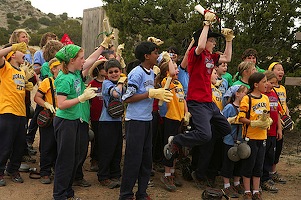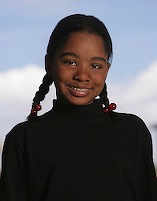Kid Nation "controversy" -- if only some people would grow up
08/22/07 02:12 PM


By ED BARK
CBS' upcoming Kid Nation may not be the greatest or noblest idea for a TV reality series. Whatever its merits or demerits, though, it surely couldn't have been all that more dangerous than playing jump rope.
Still, at least one parent is getting a lot of ink after writing a letter of complaint to New Mexico state officials after the show ended production last spring. Her daughter, 11-year-old Divad, was splattered with grease while cooking. And three other children accidentally drank a little bleach, thinking it was a soft drink. No one was hurt even remotely seriously.
This hasn't stopped The New York Times and The Los Angeles Times from recently running lengthy stories questioning whether all of this amounted to child abuse or neglect on the part of Kid Nation's producers. There also is the matter of whether the show skirted New Mexico's less restrictive child labor laws during 40 days and nights of filming in rickety old, abandoned Bonanza City.
CBS, in a statement issued to the L.A. Times, said in part that a lone parent was "distorting the true picture of the Kid Nation experience. These kids were in good hands and under good care with procedures and safety structures that arguably rival or surpass any school or camp in the country."
Networks don't always tell the truth, and in fact lie a lot to TV critics. But siding with CBS is easy in this case. The parents who sent their eight-to-15-year-old children into this enterprise haven't complained about the $5,000 "stipends" that each of their offspring received. Nor have they objected to the $20,000 "Gold Star" to be awarded in each of the planned 13 episodes.
So you might say they sold their children down the river, or in this case the show's nearby creek. But it's not as if CBS willfully exposed them to all manner of deprivation. During a mid-July "press tour" interview session with Kid Nation's producers, some TV critics were skeptical as to whether the young stars were really roughing it at all.
"Hundreds" of adults were on site, said executive producer Tom Foreman.
They included pediatricians, child psychologists and an animal wrangler, he said. All were "mostly standing back and watching the kids with instructions to step in if something was going wrong and anybody was in danger. If the kids had done something that we thought was going to hurt one of the animals, we would have stepped in, too . . . This was as well thought out a show as I have ever seen in terms of contingency plans lest any little thing go wrong."
We live, however, in times when many kids are lumps on couches. And where abuse is defined as looking cross-eyed at a kid or making him use a phone dial-up for the Internet.
Back in prehistoric times -- my 1950s childhood -- we used to play "King of the Mountain" during school recess. The mountain would be a big mound of plowed-up playground snow. The Kings usually would be school bullies. Not being one of those, I'd often end up sliding back down onto the icy pavement. A daily minimum of bruises ensued, but every once in a while you'd be able to tackle a big kid and knock him off his perch. So it was worth it, and the nuns who taught us seldom if ever bothered to protect us from ourselves. In their view, this was character-building. And sometimes they even joined in.
Kid Nation looks to be an amusement park tram ride compared to that. Still, the producers say they met with each child's parents and "they asked whatever they wanted to ask," said Foreman.
"Some parents absolutely thought of this as a 40-day vacation from their children," he said. "I think most of them had very reasonable questions about what the kids would be doing, where they would be living, what sort of food they would be eating . . . And everyone we met with opted to go ahead with the show."
Water and canned goods were provided, with the kids required to prepare it themselves. They also elected their own leaders, formed their own government, passed their own laws, etc. There are no elimination rounds, but kids could leave voluntarily. A "few" did just that, according to Foreman. But most of the kids now "wish it wasn't over," he said.
"They saw this as the greatest chance they've ever had to prove something to the adult world out there -- that they could actually show us up."
It's best to never entirely believe a television producer. In this case, though, the "brewing controversy" -- L.A. Times' words -- over Kid Nation seems far more manufactured than genuine. What else is new?
